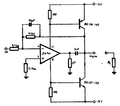Difference between revisions of "Circuit Building Blocks"
| (11 intermediate revisions by the same user not shown) | |||
| Line 8: | Line 8: | ||
===Programmable Unijunction Transistor Sawtooth=== | ===Programmable Unijunction Transistor Sawtooth=== | ||
Make Electronics: Learning by Discovery, Charles Platt | Make Electronics: Learning by Discovery, Charles Platt | ||
| + | ===Relaxation Oscillator=== | ||
| + | Amp Hour 579, A relaxation oscillator is filling up a capacitor, at which point when the cap reaches a certain voltage, the charge is dumped (possibly by a transistor) and the cycle repeats again. It may look like a sawtooth. | ||
| + | |||
| + | On the other hand, a triangle, would be a circuit that only charges/discharges the capacitor (in equal amounts)(ramp waveform: page 34 student manual for art of electronics). | ||
| + | |||
===Quick Bits Examples=== | ===Quick Bits Examples=== | ||
Most of these are also referenced in the Art of Electronics. | Most of these are also referenced in the Art of Electronics. | ||
| Line 14: | Line 19: | ||
* [https://circuitcellar.com/resources/quickbits/bandgap-voltage-reference/ Bandgap Voltage Reference] - Limiting temperature effects in semiconductors. | * [https://circuitcellar.com/resources/quickbits/bandgap-voltage-reference/ Bandgap Voltage Reference] - Limiting temperature effects in semiconductors. | ||
===Unity Gain=== | ===Unity Gain=== | ||
| − | + | <gallery> | |
| + | File:High slew rate power amplifier with A741 (IPRS databook).png|Similar diamond buffer made with op amp. Note the transistors are powered by the supply rails of the op amp. | ||
| + | File:Fairchild 1973 High Slew Rate Power Amplifier.png|Fairchild example of the diamond buffer. | ||
| + | </gallery> | ||
* https://en.wikipedia.org/wiki/Diamond_buffer - Unity gain, high current. | * https://en.wikipedia.org/wiki/Diamond_buffer - Unity gain, high current. | ||
https://www.eevblog.com/forum/projects/opamps-die-pictures/msg5450288/#msg5450288 | https://www.eevblog.com/forum/projects/opamps-die-pictures/msg5450288/#msg5450288 | ||
| Line 21: | Line 29: | ||
===Howland Topology=== | ===Howland Topology=== | ||
* [https://circuitcellar.com/resources/quickbits/howland-current-source/ Current Source (Howland)] Voltage Controlled Current Source, see also: https://www.eevblog.com/forum/beginners/current-source-with-p-channel-mosfet-not-working-as-expected/msg5447837 | * [https://circuitcellar.com/resources/quickbits/howland-current-source/ Current Source (Howland)] Voltage Controlled Current Source, see also: https://www.eevblog.com/forum/beginners/current-source-with-p-channel-mosfet-not-working-as-expected/msg5447837 | ||
| + | |||
| + | ===Transimpedance Amplifier=== | ||
| + | A way to convert current to voltage. It's just an op amp with a resistor in the feedback loop. Per amp hour 579, and talking of ADC design. There is a lot written about this, so one can dig in if necessary. e.g. | ||
| + | * https://www.ti.com/lit/ta/ssztbc4/ssztbc4.pdf - What You Need to Know about Transimpedance Amplifiers – Part 1 | ||
| + | |||
| + | ==Misc Circuits== | ||
| + | ===Debouncing=== | ||
| + | Diodesgonewild has a thorough (the best i've seen) video on the 555 timer. There are actually 2 videos. One of the circuits he shows is debouncing for an on-off switch. | ||
| + | |||
| + | [[Category:online notes]] | ||
Latest revision as of 11:33, 24 February 2025
The goal here is to have a page of various transistor circuits, but for now I'll include op amps.
They should be simple enough that you could combine them in a larger design (i.e. as part of an op amp or ASIC). I'm not going to include fundamental circuits (such as: https://en.wikipedia.org/wiki/Template:Transistor_amplifiers or basic op amps which you can find in Electronics for Inventors or AoE.)
These are sometimes called Topologies. Like a map. A map topology. If maps lie, then it's likely these circuits will lie as well. Expect any examples to be missing required components to work.
Transistor Circuits
Programmable Unijunction Transistor Sawtooth
Make Electronics: Learning by Discovery, Charles Platt
Relaxation Oscillator
Amp Hour 579, A relaxation oscillator is filling up a capacitor, at which point when the cap reaches a certain voltage, the charge is dumped (possibly by a transistor) and the cycle repeats again. It may look like a sawtooth.
On the other hand, a triangle, would be a circuit that only charges/discharges the capacitor (in equal amounts)(ramp waveform: page 34 student manual for art of electronics).
Quick Bits Examples
Most of these are also referenced in the Art of Electronics.
- Differential Pair
- Current Mirror (Wilson ver.)
- Bandgap Voltage Reference - Limiting temperature effects in semiconductors.
Unity Gain
- https://en.wikipedia.org/wiki/Diamond_buffer - Unity gain, high current.
https://www.eevblog.com/forum/projects/opamps-die-pictures/msg5450288/#msg5450288
Op Amp Circuits
Howland Topology
- Current Source (Howland) Voltage Controlled Current Source, see also: https://www.eevblog.com/forum/beginners/current-source-with-p-channel-mosfet-not-working-as-expected/msg5447837
Transimpedance Amplifier
A way to convert current to voltage. It's just an op amp with a resistor in the feedback loop. Per amp hour 579, and talking of ADC design. There is a lot written about this, so one can dig in if necessary. e.g.
- https://www.ti.com/lit/ta/ssztbc4/ssztbc4.pdf - What You Need to Know about Transimpedance Amplifiers – Part 1
Misc Circuits
Debouncing
Diodesgonewild has a thorough (the best i've seen) video on the 555 timer. There are actually 2 videos. One of the circuits he shows is debouncing for an on-off switch.

